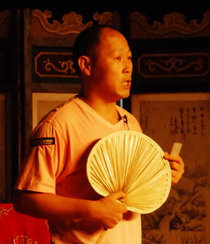Kuang Biao (邝飚) is an influential Chinese political cartoonist and microblogger.[1] He has worked at the Southern Metropolis Daily as its Cartoon Editor, and his work has been published in China Digital Times and the once-popular weekly Chinese newspaper Satire and Humor.[2][3] Kuang says his cartoons mainly satirize official policy pronouncements and the misbehaviour of Communist party officials.[4]
| Kuang Biao | |
|---|---|
 Kuang in 2010 | |
| Nationality | Chinese |
| Chinese name | |
| Simplified Chinese | 邝飚 |
| Traditional Chinese | 鄺飈 |
| Hanyu Pinyin | Kuàng Biāo |
Censorship
editHe is one of several commentators who have had their online Weibo microblogging accounts shut down in an attempt at censorship by the Chinese Communist Party.[4] He states that he has had his Weibo account shut down "dozens of times", but according to Xinhua, users of such accounts will subject to intensified online management, and would not be allowed to register again under another name.[3] Previously, Kuang Biao had been including his ‘reincarnation count’ each time he re-registered for Weibo. For example, in May 2015, his username was ‘Uncle Biao Fountain Pen Drawings 47’, or Kuangshugangbihua47.[5]
Activism
editKuang has created artworks in response to many subjects considered sensitive by authorities in China, such as the tainted milk scandal and the activities of dissidents such as Chen Guangcheng.[6]
He was demoted by Southern Metropolis daily after depicting a journalist, Chang Ping in a stranglehold, after Chang had been barred from writing for two newspapers due to controversy over his article Tibet: Nationalist Sentiment and the Truth.[2]
In 2013, he created a cartoon condemning the execution of street vendor Xia Junfeng who had been charged with murder, after claiming self-defence during an attack by chengguan, or urban law enforcement officers.[7] In 2015, Kuang was one of three Chinese cartoonists who created works expressing displeasure at the French comic magazine Fluide Glacial, for its portrayal of the Chinese people.[8] In February 2020, he portrayed Li Wenliang, the Wuhan physician who warned about and died in the COVID-19 outbreak.[9]
David Bandurski, a researcher with the University of Hong Kong, says the internet has dramatically changed the environment for Chinese political cartoonists, who now have a good platform to find an audience.[10]
References
edit- ^ Fisher, Max (2013-01-03). "The political cartoons that maybe got their artist shut down on Chinese social media". The Washington Post. Retrieved 2016-06-04.
- ^ a b Weinland, Don (16 September 2010). "Cartoonist Kuang Biao Punished for Cartoon About Chang Ping - China Digital Times (CDT)". China Digital Times. Retrieved 2016-06-04.
- ^ a b Henochowicz, Anne (29 February 2016). "Kuang Biao (邝飚): Ren Zhiqiang's Struggle - China Digital Times (CDT)". China Digital Times. Retrieved 2016-06-04.
- ^ a b Richburg, Keith B. (2013-01-03). "China's 'weibo' accounts shuttered as part of Internet crackdown". The Washington Post. Retrieved 2016-06-04.
- ^ China Digital Times (16 July 2015). Decoding the Chinese Internet: A Glossary of Political Slang. China Digital Times Inc. pp. 64–. ISBN 978-0-9898243-4-7.
- ^ "Chinese Cartoonists Try to Push Boundaries". Public Radio International. 2012-06-28. Retrieved 2016-06-04.
- ^ Geremie R Barmé; Linda Jaivin; Jeremy Goldkorn (5 November 2015). Shared Destiny: China Story Yearbook 2014. ANU Press. pp. 280–. ISBN 978-1-925022-94-0.
- ^ "Cartoonists refute French satire". China Daily. 2015-01-25. Retrieved 2016-06-04.
- ^ "In life, he was China's coronavirus hero. In death, he's a symbol of outrage". The Star. 2020-02-06. Retrieved 2020-03-28.
- ^ Frank Langfitt Twitter Facebook Instagram. "Provocative Chinese Cartoonists Find An Outlet Online". NPR.org. NPR. Retrieved 2016-06-04.
{{cite web}}:|author=has generic name (help)